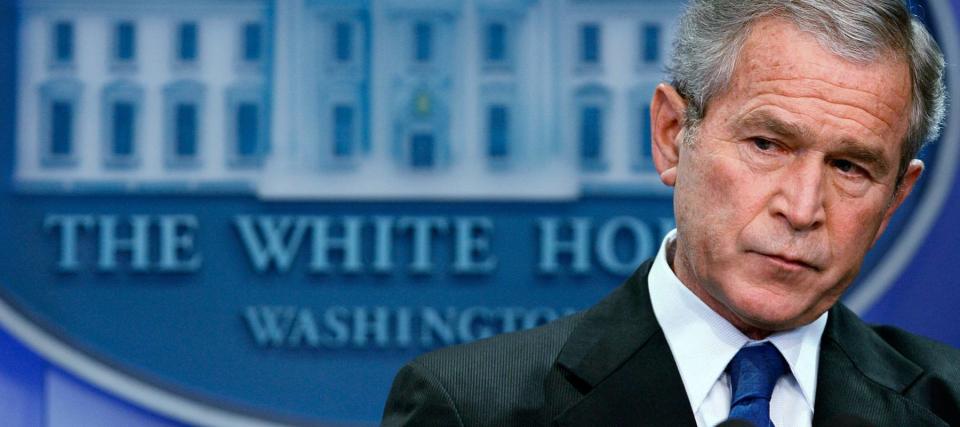
Instead of quoting a historical figure like Adam Smith, Daniel Kahneman or John Maynard Keynes, legendary investor Warren Buffett believes the most consequential words on modern economics came from a surprising source: former U.S. President George W. Bush.
At the height of the 2008 financial crisis, Bush said: “If money isn’t loosened up, this sucker could go down!”
Don’t miss
-
Commercial real estate has beaten the stock market for 25 years — but only the super rich could buy in. Here’s how even ordinary investors can become the landlord of Walmart, Whole Foods or Kroger
-
Car insurance premiums in America are through the roof — and only getting worse. But 5 minutes could have you paying as little as $29/month
-
These 5 magic money moves will boost you up America’s net worth ladder in 2024 — and you can complete each step within minutes. Here’s how
Buffett deemed this quip “the 10 most important words in the history of economics,” he told billionaire Dan Gilbert during an interview at the Detroit Homecoming event at the College for Creative Studies in 2014.
Here’s why Buffett believes these words had such a great impact on the global economy.
Reassuring the market
Buffett believes at the time the global economy had hit a moment of panic when it seemed U.S. money market funds were in jeopardy.
Money market funds are mutual funds that invest in highly liquid, near-term instruments such as U.S. Treasuries. They are insured by the Federal Deposit Insurance Corporation. In other words, they’re a place where people park their money for safekeeping. But when that sense of security was questioned, panic spread.
“Thirty-five million Americans at the start of September [2008] thought $3.5 trillion of their money was safe in money market funds,” Buffett said. “Then, in one week, they got worried about it.”
He believes, during this critical moment, Bush’s words were a signal to Hank Paulson, Secretary of the Treasury at the time, along with Federal Reserve chair Ben Bernanke, that all options to secure the money market were on the table.
“Bernanke and Paulson could then say, ‘We’ll do whatever it takes,’” Buffett explained.
Read more: Car insurance rates have spiked in the US to a stunning $2,150/year — but you can be smarter than that. Here’s how you can save yourself as much as $820 annually in minutes (it’s 100% free)
What it took to rescue the economy was an unorthodox program known as quantitative easing. Effectively, Bernanke and Paulson coordinated a series of actions, including the purchasing of securities, to inject money into the financial system. This lowered borrowing costs and increased the money supply.
From 2008 to 2015, the Fed’s balance sheet surged more than fourfold, to about $4.5 trillion, according to the Federal Reserve Bank of Philadelphia.
In other words, money loosened up.
Nowadays, however, investors seem to be witnessing this phenomenon in reverse.
Quantitative tightening
The biggest challenge in recent years apparently hasn’t been the lack of cash, but too much of it. Money supply in the economy boomed during the pandemic which may have been a key reason for heightened inflation, according to Christopher J. Neely, Senior Economic Policy Advisor, Federal Reserve Bank of St. Louis.
To tame inflation, Fed chairman Jerome Powell engaged in a quantitative tightening program in June 2022. In other words, money would be tightened up in the system. Since then, the Fed’s balance sheet has declined from nearly $9 trillion to $7.2 trillion.
Raising interest rates has also been part of the quantitative tightening program. The Federal Reserve raised its benchmark interest rate from 0.25% to between 5.25% and 5.5%.
For ordinary savers, this means better returns on fixed-income products. The Vanguard Federal Money Market Fund offers an attractive yield of 5.29%, while the iShares U.S. Treasury Bond ETF offers a yield of 4.4%.
For those seeking steady passive income, parking money in treasury bonds and money market funds can be fairly lucrative these days.
What to read next
This article provides information only and should not be construed as advice. It is provided without warranty of any kind.
